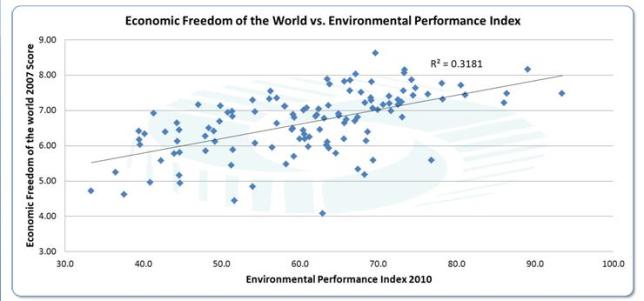Plotting the Fraser Institutes’ Economic Freedom of the World Index vs. Yale and Columbia Universities’ Environmental Performance Index finds that free markets and good environmental performance go hand in hand.

Environmental concern often manifests itself through calls for government to take a greater role in the economy by owning more assets and regulating what people can do with privately owned assets or by subsidizing some activities at the expense of others. The intuition behind these calls is usually that environmental features such as the air, water, or wild animals are subject to a tragedy of the commons problem where, left to their own devices, people will make private profit at the public expense by destroying those environmental features.
However the data in this Charticle show that the call and the intuition may be wrong. Countries with greater economic freedom achieve better results with respect to environmental performance than countries which are less economically free. The Fraser Institute’s Economic Freedom of the World Index is a measure of the extent to which countries have a small size of government, secure property rights, a stable money supply, light business and employment regulations, and free trade. The Environmental performance Index measures the extent to which countries’ air and water, biodiversity, forests, and fisheries are in good condition. These groups of indicators seem to improve with each other across the countries.
Of course, statistical data sets throw up a large number of correlations, and correlation does not prove causation. This relationship does however show that adopting “free market” policies does not make a country a poor environmental custodian. There is not a general trade-off between liberalizing economies and having a sound environment.
However there are also several potential explanations for the apparent relationship between free markets and environmental performance.
The Economic Freedom Index is largely a measure of the extent to which people can exert private control over the country’s assets. For example, when individuals are able to assert control over property through strong property rights, that is counted as economic freedom. Importantly, private control of assets is one antidote to environmental abuses.
Most environmental problems reduce to tragedy of the commons type problems where people find it advantageous to abuse collectively held assets for their own private profit. For example over-fishing used to be a problem in New Zealand and Iceland before quota systems effectively privatized the right to fish and gave fishers an incentive to leave some fish for next year (because they owned the right and didn’t have to worry about others taking the fish if they didn’t). This ‘private control’ aspect of the Economic Freedom of the World Index may go some way to explaining the correlation between economic freedom and environmental performance.
Conversely, environmental performance and economic freedom both correlate not only with each other but also with greater wealth. It may be that wealthier countries are the ones who can afford, for example, to save wilderness land by using efficient farming techniques to get more food from less farm land.
Some will argue that rich countries are better environmental stewards because they enforce more regulations aimed at protecting their environmental assets. This is undoubtedly true, however it is again the causal explanation that matters: People must become wealthy and satisfy their more basic needs before they can contemplate environmental regulations. Given that freer markets appear to cause wealth throughout the world and throughout history, it could be argued that they enable better environmental stewardship in doing so.
People concerned about how people are impacting the environment should realize that free markets don’t harm the planet, and quite likely help it.
Data Source: Fraser Institute Economic Freedom of the World Index, 2007; Yale Center for Environmental Law and Policy, Center for International Earth Science Information Network Environmental Performance Index, 2010
Read in PDF format here.



